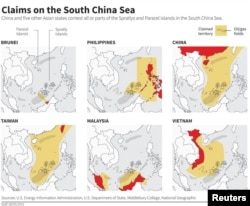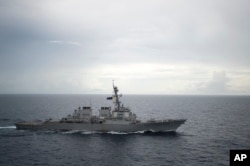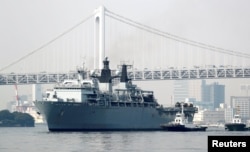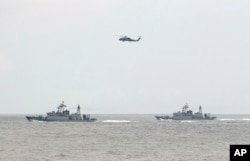A British amphibious warfare ship passed through the South China Sea in August and China, Asia’s strongest military power with a claim to almost the whole waterway, expelled it. Now the European country with a once powerful colonial foothold in Asia wants to set up a new base in the region, according to news reports citing the British defense secretary.
A British base in Southeast Asia, where four countries dispute China’s maritime claims, would give ships quicker access to any further missions like the one August 31.
More likely, Asian political experts say, it will let the U.K. challenge China’s influence — and get challenged back — in the resource-rich sea by helping British ships join allied American vessels for periodic naval exercises. Britain alone lacks the money and must mind relations with former colonies in Southeast Asia, they say.
“They would have to team up with the U.S., otherwise it doesn’t make sense,” said Eduardo Araral, associate professor at the National University of Singapore’s public policy school. “They would join the U.S. in their so-called freedom of navigation operations.”
Defense Secretary Gavin Williamson told the British news outlet The Telegraph in December that his country was looking for a new base in Southeast Asia.
Newcomer to wider maritime conflict
Brunei, Malaysia, the Philippines, Taiwan and Vietnam contest China’s maritime sovereignty claims but have gone on the back foot since 2010 as Beijing uses technological and economic advantages to expand at sea. It has landfilled a series of tiny islets, some for military use.
China claims about 90 percent of the sea that extends from Hong Kong to Borneo, spanning 3.5 million square kilometers. China and rival claimants in Asia value the sea for its fisheries and fuel reserves. The UK government does not have a claim.
Washington regularly sends naval ships into the sea to pressure China. It calls the missions “freedom of navigation operations.”
Earlier this month a U.S. warship passed through waters off the sea’s Paracel Islands, which China controls despite a competing claim from Vietnam.
Japan and Australia have sent their own ships to keep China in check, though less often. The UK would anger China if it fell into that line, scholars say.
“China would of course object heavily, but I think for the rest of Southeast Asian countries it’s not something new,” said Oh Ei Sun, senior fellow with the Singapore Institute of International Affairs.
In September, Beijing treated the single ship, the British navy’s HMS Albion, as an intrusion into Chinese territory. The vessel “entered China’s territorial sea without the Chinese government's approval,” Chinese state-controlled media outlet Gbtimes.com reported, citing Foreign Ministry spokeswoman Hua Chunying.
The UK probably lacks funds for a major South China Sea initiative, Oh said. “I think we have to be very realistic about this,” he said. “Even the UK’s naval fleet is not like during the British empire.”
Britain may be planning the base to expand into Asia strategically and economically “as an independent actor” after leaving the European Union, said Carl Thayer, emeritus professor at the University of New South Wales in Canberra.
In 2016, Thayer noted, British Prime Minister Theresa May and the former foreign secretary began to “float the idea of a Global Britain in the post-Brexit era.”
Southeast Asian reactions
Southeast Asian countries might struggle to accept a British base.
The UK has sighted Singapore and Brunei as candidates for a base, The Telegraph says.
Southeast Asian leaders would worry that allowing a base hearkens back to colonialism or other foreign domination, scholars say. Brunei, Malaysia, Myanmar and Singapore are former British colonies in Southeast Asia.
“There is always a domestic element to it for the host country,” said Collin Koh, a maritime security research fellow at Nanyang Technological University in Singapore.
“Basically it would impinge upon perceptions of sovereignty, for example, and the fact that people will start to question the government whether it will allow in foreign presence to sort of subvert our foreign policy,” he said.
Countries such as Brunei must also mind their own growing, economically vital ties with China before entering a military deal opposed by Beijing, he added.
The UK now maintains a logistics facility at the Sembawang Naval Base in Singapore.
In Taiwan, President Tsai Ing-wen indicated support Saturday for British presence near the South China Sea. Taiwan claims the whole sea but holds just two of its hundreds of disputed islets. It has its own territorial issues with China and Tsai has asked other countries to help resist Beijing.
“We respect any country to exercise its rights of freedom of navigation in the South China Sea, and we are open-minded about these issues as long as it helps to maintain peace in this region,” she told reporters on Saturday.








